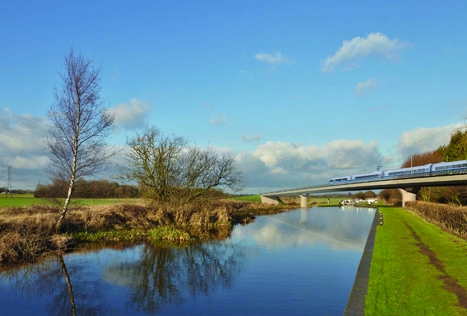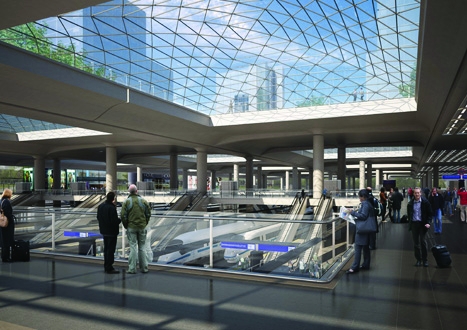
Phase one will consist of two stages, the first of which involves design and construction preparation, and is already underway. Stage 2, set to commence in 2019, will see the main body of construction work take place, delivering the tunnels, bridges, viaducts and embankments for the new London to Birmingham line. While Phase One is due for completion in 2026, it has also been announced that work extending the line from the West Midlands to the West Coast Main Line south of Crewe should be completed by 2027, six years earlier than previously planned. The complete HS2 project should carry around 300,000 passengers a day, relieving pressure on local rail services.
“HS2 will deliver vital links between some of our country’s biggest cities, helping to drive economic growth and productivity in the north and midlands,” said transport secretary Chris Grayling. “As well as providing desperately needed new seats and better connecting our major cities, HS2 will help rebalance our economy.”
Contracts for the two stages of Phase One are worth an estimated £6.6bn and are expected to directly support 16,000 jobs. According to the government, the project will also present 7,000 contract opportunities in the supply chain, of which about 60 per cent should go to SMEs.
“This is a huge day for the HS2 project and for the country,” said David Higgins, chairman of HS2 Ltd. ”These contracts will support 16,000 jobs here in Britain and will create opportunities for thousands of SMEs.”

“HS2 was always designed to be much more than just a high speed railway and today we can see the opportunities it brings right around the country - spreading prosperity, acting as a catalyst for investment and rebalancing our economy 10 years before the railway even opens. Business now has the surety to invest with confidence to build a legacy for Britain.”
Manufacturers’ organisation EEF welcomed the announcements, but urged the government to remain ambitious in its plans for rail investment, and build on the expertise acquired in recent years through major projects such as Crossrail.
“Manufacturers also want to see significant investment in commuter rail lines across the country as an opportunity to widen access to the talent pools they need for their business,” said Chris Richards, head of Business Environment Policy at EEF.
“The government and new metro mayors must urgently press ahead with these lines, such as High Speed 3 linking Liverpool with Hull, to balance national connectivity with regional ones”. “This will help ensure all parts of Britain have ready access to the talent, supply chains and export gateways that a post-Brexit Britain will need.”
Alongside the contracts for Phase One construction, invitations for tender for the design of the four new stations have now also been released.
Details on the winning bids for Phase One are:
Area South
Euston Tunnels and Approaches – SCS JV (Skanska Construction UK Ltd, Costain Ltd, STRABAG AG)
Northolt Tunnels – SCS JV (Skanska Construction UK Ltd, Costain Ltd, STRABAG AG)
Area Central
Chiltern Tunnels and Colne Valley Viaduct – Align JV (Bouygues Travaux Publics, VolkerFitzpatrick, Sir Robert McAlpine)
North Portal Chiltern Tunnels to Brackley – CEK JV (Carillion Construction Ltd, Eiffage Genie Civil SA, Kier Infrastructure and Overseas Ltd)
Brackley to South Portal of Long Itchington Wood Green Tunnel – CEK JV (Carillion Construction Ltd, Eiffage Genie Civil SA, Kier Infrastructure and Overseas Ltd)
Area North
Long Itchington Wood Green Tunnel to Delta Junction and Birmingham Spur – BBV JV (Balfour Beatty Group Ltd, VINCI Construction Grands Projets, VINCI Construction UK Ltd, VINCI Construction Terrassement)
Delta Junction to WCML Tie-In – BBV JV (Balfour Beatty Group Ltd, VINCI Construction Grands Projets, VINCI Construction UK Ltd, VINCI Construction Terrassement)





Glasgow trial explores AR cues for autonomous road safety
They've ploughed into a few vulnerable road users in the past. Making that less likely will make it spectacularly easy to stop the traffic for...